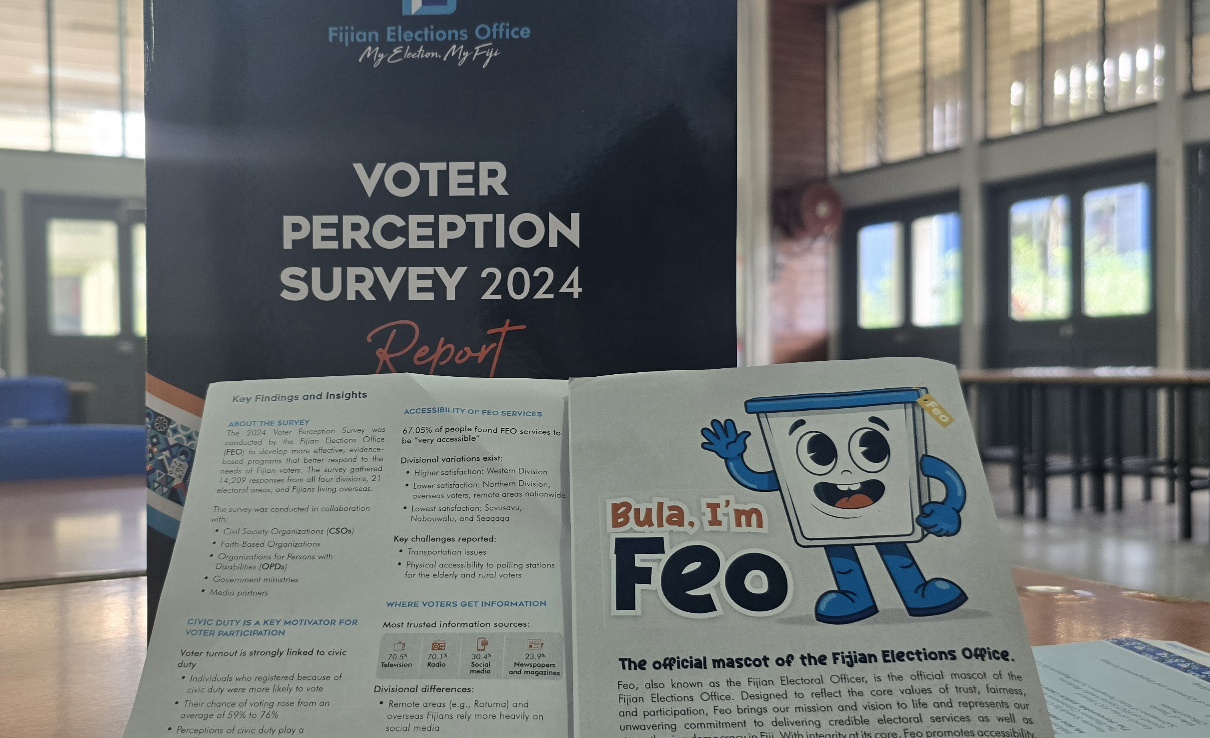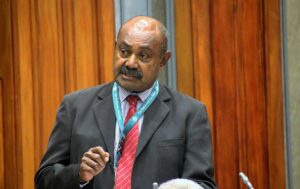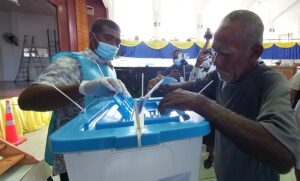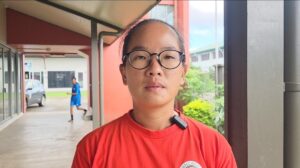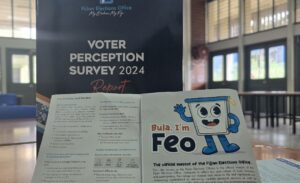A new survey reveals that while most Fijians feel a strong sense of civic duty and find election services accessible, significant concerns remain over low voter turnout, limited overseas participation, and uneven trust in the electoral process—just as the 2026 general election approaches its earliest possible date.
These are among findings, outlined in the 2024 Voter Perception Survey the Supervisor of Elections, Ana Mataiciwa, handed over to Electoral Commission Chair Justice Usaia Ratuvili in an event attended by political party representatives, members of the diplomatic corps, civil society groups, and stakeholders from across Fiji’s election system.
The Fijian Elections Office carried out the survey to develop evidence-based programs that better address voter needs. In partnership with civil society, faith groups, disability organisations, government ministries, and media, the survey collected 14,209 responses from Fiji’s four divisions, 27 electoral areas, and overseas Fijians.
Among the most notable findings was the strength of civic duty as a motivator for voter participation. The data showed that individuals who registered to vote out of a sense of national responsibility were significantly more likely to vote than others. Their likelihood of turning out increased from an average of 59% to 76%.
Although most respondents—67.05%—said they found FEO services “very accessible,” the report also highlighted disparities. Urban voters, particularly in the Western Division, reported higher satisfaction, while people in rural areas, the elderly, and Fijians living overseas reported greater difficulty accessing services. Satisfaction was particularly low in areas like Savusavu, Nabouwalu, Seaqaqa, and Taveuni, where physical access to polling stations and election offices was raised as a recurring issue.
Public confidence in the fairness and integrity of the election process also showed a mixed picture. Just over half of voters—55.15%—said they were “very confident” in the process overall.
However, confidence levels varied significantly by location.
Voters in the Western Division expressed the highest levels of trust, while those in the Northern Division and overseas were more sceptical.
About 51% of respondents strongly agreed that the FEO conducts elections in a fair, transparent, and impartial manner.
According to the report, voter trust appears to be influenced not just by individual experiences with election services but also by external factors such as political discourse and media narratives.When asked why they registered to vote, respondents cited both practical needs and social influences.
Civic duty (63.8%) and obtaining a voter ID (62.5%) were the top two reasons given. About 43%% of voters said family members encouraged them to register, and 31.5% credited friends.
About 30.5% said they were motivated by information and outreach from the FEO itself, showing the ongoing importance of direct awareness campaigns.
On the question of where voters get their election information, traditional media continues to lead. Radio and television were each used by more than 70% of respondents.
At the same time, social media is becoming increasingly relevant, particularly for younger voters, remote communities like Rotuma, and Fijians overseas.
Print media continues to serve as a useful backup, particularly during times of power or network outage, though it was not a significant source for voters in certain locations—no respondents in Rotuma, for example, reported using newspapers to obtain election information.
One of the most striking contrasts in the survey came from overseas Fijians. Although this group reported the highest levels of civic duty, only 6.9% of them voted in the last election. Postal voting was also low, with just 1.9% of respondents saying they used it.
The report links both trends to a lack of awareness and the perceived complexity of the voting process. Many voters expressed the need for clearer instructions and improved access to support.
In response, the FEO has outlined several key actions it plans to take. These include civic duty campaigns aimed at reinforcing the importance of voting as a shared national responsibility, targeted outreach for overseas voters using embassies and consulates, and new awareness drives using a mix of digital and traditional platforms depending on audience.
The office also intends to improve services in underserved areas, particularly in the Northern Division, and tailor communications to meet the needs of the elderly, disabled voters, and those in linguistically diverse or low-literacy communities.
To rebuild trust, the FEO is also considering steps to improve its public visibility and institutional transparency, including more proactive communication and consistent adherence to its internal code of conduct.
The 2026 general election may be called – any time between August 7, 2026, and February 6, 2027. The writ of election is expected to be issued between June 24 and December 24 next year.
Speaking at the launch, Mataiciwa said the survey findings would inform the FEO’s preparatory work for the upcoming election cycle.
The event also featured the launch of the FEO’s official mascot, “FEO,” and the rollout of its new social media platforms on Instagram and LinkedIn—part of a wider push to engage with voters, especially younger demographics, ahead of the next general election.

